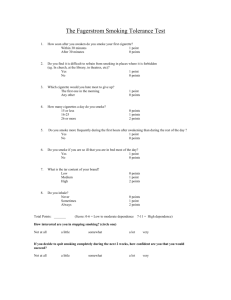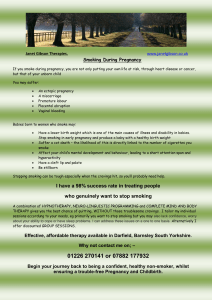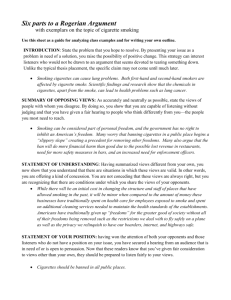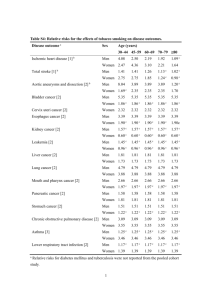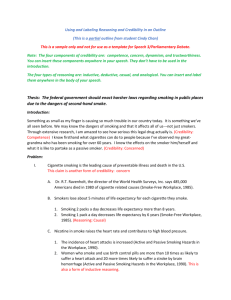SÜLEYMAN ŞAH UNIVERSITY FOREIGN LANGUAGES
advertisement
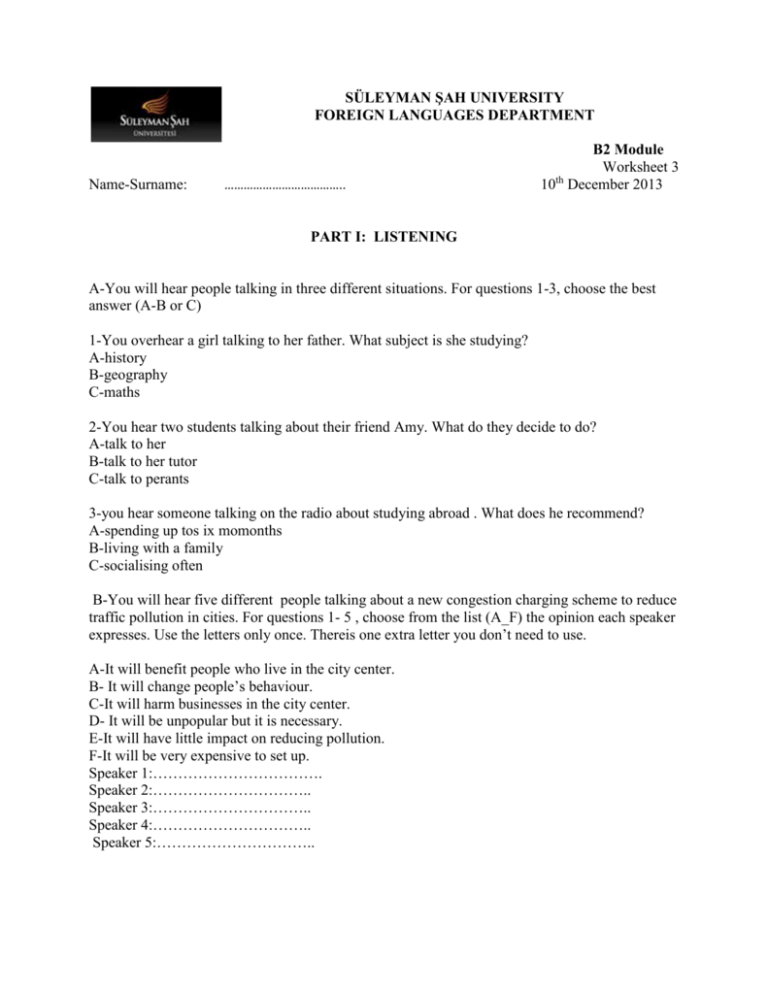
SÜLEYMAN ŞAH UNIVERSITY FOREIGN LANGUAGES DEPARTMENT Name-Surname: ……………………………….. B2 Module Worksheet 3 10th December 2013 PART I: LISTENING A-You will hear people talking in three different situations. For questions 1-3, choose the best answer (A-B or C) 1-You overhear a girl talking to her father. What subject is she studying? A-history B-geography C-maths 2-You hear two students talking about their friend Amy. What do they decide to do? A-talk to her B-talk to her tutor C-talk to perants 3-you hear someone talking on the radio about studying abroad . What does he recommend? A-spending up tos ix momonths B-living with a family C-socialising often B-You will hear five different people talking about a new congestion charging scheme to reduce traffic pollution in cities. For questions 1- 5 , choose from the list (A_F) the opinion each speaker expresses. Use the letters only once. Thereis one extra letter you don’t need to use. A-It will benefit people who live in the city center. B- It will change people’s behaviour. C-It will harm businesses in the city center. D- It will be unpopular but it is necessary. E-It will have little impact on reducing pollution. F-It will be very expensive to set up. Speaker 1:……………………………. Speaker 2:………………………….. Speaker 3:………………………….. Speaker 4:………………………….. Speaker 5:………………………….. PART 2 READING One Monday evening last November, Gaby Leboeuf decided to give up smoking... 1. One Monday evening last November, I turned up at my local "Women's Quit Smoking Group" at the village hall, keen to stop, but a little frightened about the sort of people I would meet there. I was expecting them all to be wrinkled, grey-haired people in their forties and fifties, who had been smoking a steady forty cigarettes a day for thirty years, whereas I just smoked a modest ten cigarettes a day. 2. I took up smoking 10 years ago, when I was 16, and for the last three years I have been trying to give up. But when I saw the group, I was in for a surprise. There were fourteen women sitting in the hall, many of whom were looking more nervous than me, and there were three who were younger than me. 3. We were led by Jerry, a cheerful woman in her thirties who had kicked the habit five years ago. In answer to our questions she told us that nowadays, in our society, more women smoke than men - 30% more, according to the statistics. And in the United States 1,500 girls of 18 or less start smoking every day. In fact, many girls, after they have smoked just a hundred cigarettes in their lives, already want to give up, but do not know how. 4. Jerry insisted that in order to give up, it is a good idea to discover why we started in the first place, and here she put the blame squarely on the tobacco companies for directing much of their advertising at women. She showed us a video of examples of cigarette advertising with pictures of young, attractive models smoking cigarettes, all of which makes people believe that smoking is a fashionable activity for women. And if people believe something is fashionable, it is. 5. Many advertisements also give the impression that smoking is healthy: we see pictures of healthy young people, and especially sportsmen and sportswomen alongside advertisements for cigarettes. According to Jerry, our common sense will tell us we cannot smoke and keep fit, but subconsciously, we believe the opposite - at least to begin with. 6. Smoking advertisements are particularly persuasive for women because they encourage us to believe that smoking will make us slim. There is some truth in this - women who smoke weigh less and eat less, and when they give up, they tend to put on weight, possibly because they start eating instead of smoking. 7. It is no accident either that many of us start smoking when we are teenagers, just at the time when we are trying to become independent of our parents. Few parents are happy when their children start smoking, and children use this as a signal to their parents that they are losing their power over them. For teenage girls this is even more important as they have to fight harder to become independent of their parents than boys. 8. As the hall began to fill with smoke (smoking is not forbidden in the early sessions), we began to have a clearer idea of the things which influence us to smoke. Jerry insisted that if we understood the pressures making us smoke, we would find it easier to deal with them. Kicking the habit would never be easy, she told us, but people who want to usually manage it. And the more times you try, the more likely you are to succeed. 9. After answering our questions, she asked each person present why they wanted to stop. Several people mentioned pressure from their family, their boyfriends or husbands. Others talked about the effect on their health and fitness. One mentioned a death in the family which had resulted from smoking. Funnily enough, no one mentioned the cost as the main reason for wanting to give up, and, in spite of Jerry's lecture on cigarette advertising, almost everybody blamed themselves for having started in the first place. They saw smoking as evidence of weakness in their character and as evidence that they were not as independent of social and commercial pressures as they would like to believe. Read the text above as quickly as possible to find in which paragraph the writer mentions these ideas. Write the number of the paragraph or paragraphs in the space after the sentence. Do not try to understand the whole text yet. In which paragraph(s) does the writer mention: reasons for wanting to stop smoking? a first step in trying to give up smoking? some statistics? being surprised? the physical effect on women? reasons why people between 13 and 19 in particular start smoking? general reasons for starting to smoke? (3 paragraphs) feeling nervous? Choose the best answer: 1 The writer felt nervous about joining the group because A she thought it would be difficult to stop smoking. B she didn't smoke as much as the other people in the group. C she thought the other people would be different from her. D she imagined the other people would not be so keen to stop. 2 What surprised the writer was A the number of women in the group. B how worried some of the women seemed. C the age of some of the women. D the fact that none of them had grey hair. 3 According to Jerry's statistics A people become addicted very soon. Paragraph number (s) B more girls start smoking than men. C the majority of smokers are under 18. D women smoke more heavily than men. 4 Which of these is not given as a reason for starting to smoke? A Making friends. B Doing what other people do. C Doing what people we admire do. D Interest in our physical appearance 5 Women who smoke A are heavier than non-smokers. B are healthier than non-smokers. C eat more than non-smokers. D are lighter than non-smokers. 6 According to the writer, many people between 13 and 19 start smoking because A their parents want them to. B it makes them feel more powerful. C they want to change their relationship with their parents. D they enjoy it. 7 According to Jerry, in order to give up smoking, you should A try several times. B understand why you smoke. C change your attitude to life. D have your ideas clear. PART 3 VOCABULARY A-Write two examples to the following suffixes. Suffixes that form nouns: 1-……………………, 2-………………………. Suffixes that form adjectives: 1-……………………, 2-………………………. Suffixes that form verbs: 1-……………………, 2-………………………. B-Match the prefixes and the meanings Anti:……………. a)middle Co:…………… b)more Extra:…………….. c)again In:………………. d)together Inter:……………. e)go between Mid:……………… f)incorrect, badly Mis:……………… g)against Re:………………. h)not C-Fill in the blanks with the correct word: There are two extras. Milestone-relies on-innate-pinpoint-entitled-exxagerating -assumptions-impassioned-reversed-consistent with1-I’m not …………………... It was the worst film I’ve ever watched. 2-It’s not possible to ……………………. precisely the time of his death. 3-His most impressive quality was his ………………………… goodness. 4-Employees are ……………………… to severance pay. 5-Relatives of the dead make an ……………………………. plea fort he bodies to be flown back to this country. 6-The success of this project ……………………….everyone making an effort. 7-People tend to make …………………………………….about you when you have a disability. 8-now that you have a job and I don’t, our situations are …………………………………. D-Match the words with their meanings , There are two extras. 1-capable:……………….. a)correctly 2-assume:…………………. b)choose 3-sibling:………………… c)able to do something 4-guidance:………………. d)serious 5-accurately………………… e)importance 6-select:………………… f)brother or sister 7-burden:…………………. g)help, advice 8-profound:………………….. h)think 9-significant:………………….. 10-confusion…………………….. PART 4 USE OF ENGLISH A-For Questions 1-16, read the text below and think of the word which best fits each space. Use one word in each space. In this cloze, all the missing words are verbs. Look carefully at the rest of the sentence and the prepositions to decide which verb is correct. Be careful to put it in the correct form. Remember that some of the verbs may be irregular! There are some clues below. Roald Amundsen Roald Amundsen, who was the first man to 1._____ the South Pole in 1911, had 2._____ medicine at university before 3.____ a sailor. He had intended to be the first person to the North Pole, but when he 4._____ that an American called Peary had got there first, he secretly 5._____ out for the South Pole - a secret that only his brother 6._____ . Amundsen 7._____ up his base in the Bay of Whales in Antarctica and there he prepared his journey carefully. He 8._____ a shorter trip into the interior of the continent to leave supplies for the big journey to the Pole. In order to transport the supplies, he used dogs to 9._____ the sleds. He 10._____ his journey on October 19th 1911, and 11._____ at the Pole on December 14th. He finally 12.____ to his base at the end of January. Amundsen 13._____ enough money from his Antarctic adventure to start a successful shipping business, but he 14._____ to be interested in polar exploration, and during the 1920s he 15._____ over the North Pole in various types of aircraft before 16._____ in an accident in 1928. CLUES 1. This means "arrive at". 2. What you do at university! 3. First he was a medical student, and then something else - and remember what form of the verb you use after prepositions. 4. He found out that Peary had got there first. 5. A multi-word verb meaning to start a journey. 6. This verb goes with secrets. 7. A multi-word verb meaning "established". 8. A verb which goes with trips and journeys. 9. What would the dogs do with the sled? Can you guess what a sled is - think about people travelling long distances across the snow in days before snowmobiles existed. 10. He set out on his journey. 11. He reached the Pole. 12. He got back to his base. 13. A verb which goes with money. 14. He was still interested in polar exploration. 15. What you do with aircraft. 16. His final action. B-TRANSFORM THE SENTENCES USING THE WORDS BELOW SO THAT THE MEANING WON’T CHANGE. 1. They've already sold all the tickets. been All the tickets ………………………………. sold. 2. I expect you were very angry. must You ……………………………………….. very angry. 3. 'I didn't break the glass', said Paul. denied Paul ……………………………………. the glass. 4. They'll understand you if you speak slowly. won't They …………………………………… you speak slowly. 5. Bob last saw Mary in 1980. seen Bob …………………………………….. 1980. 6. David is too young to drive a car. old David …………………………………… drive a car. 7. It was hard for Sarah to understand him. in Sarah ………………………………… understanding him. 8. I haven't smoked since 1990. gave I ………………………………………. 1990. C-The first sentence is in the ACTIVE VOICE. Choose the most correct way of saying the same thing in the PASSIVE VOICE 1. They were interviewing her for the job. She ________________ for the job. A- was being interviewed B- was interviewed C- has been interviewed 2. Tom is writing the letter. The letter ________________ by Tom. A- was written B- is being written C- has been written 3. Everyone understands English. English ________________ by everyone. A- is understood B- has been understood C-was understood 4. The employees brought up this issue during the meeting. This issue ________________ by the employees during the meeting. A- has been brought up B- is brought up C-was brought up 5. The professor told him not to talk in class. He ________________ by the professor not to talk in class. A-has been told B- was told C- was being told 6. They say that women are smarter than men. Women ________________ to be smarter than men. A-were being said B-were said C-are said 7. The fire has destroyed the house. The house ________________ by the fire. A- has been destroyed B-was being destroyed C- is destroyed 8. She would have told you. You ________________ by her. A-would have been told B- would be told C- were being told 9. She would reject the offer. The offer ________________ by her. A- will have been rejected B- would be rejected C- will be rejected 10. This surprises me. I ________________ by this. A-would have been surprised B-will be surprised C-am surprised

